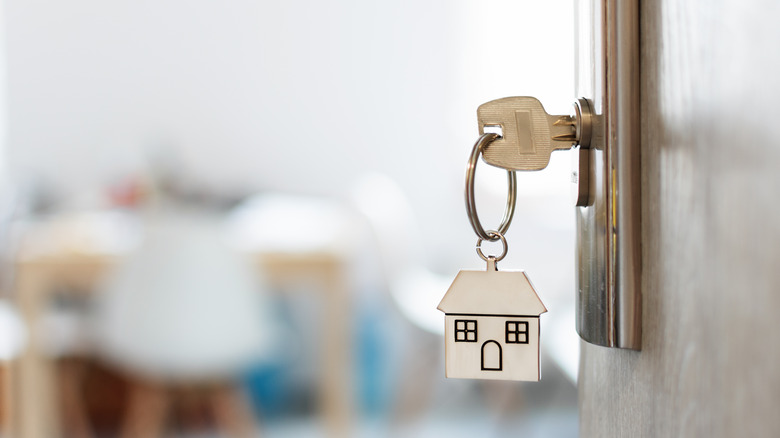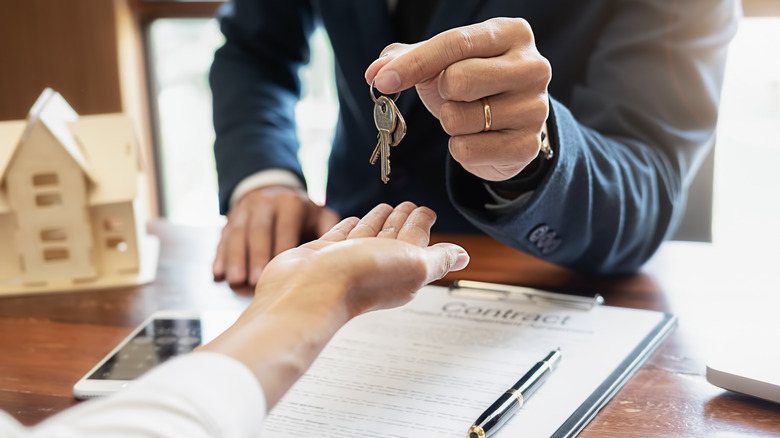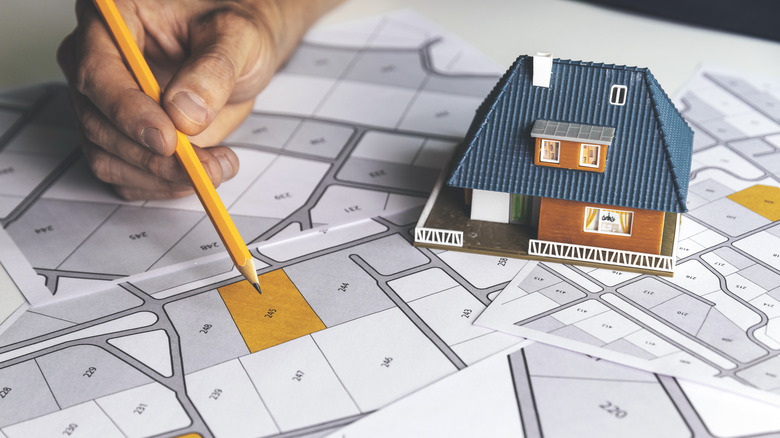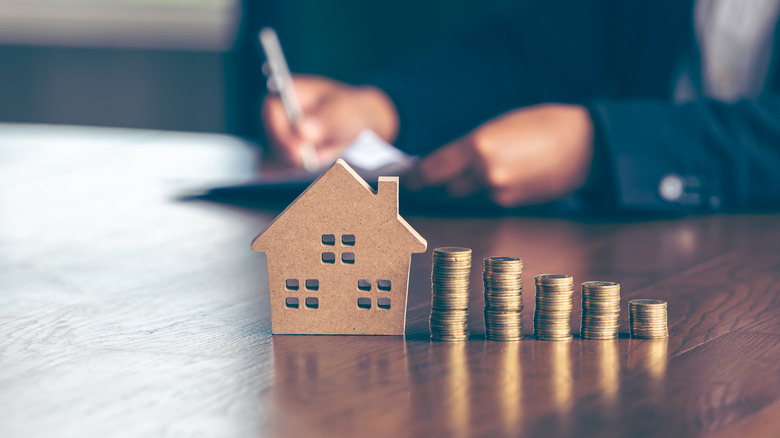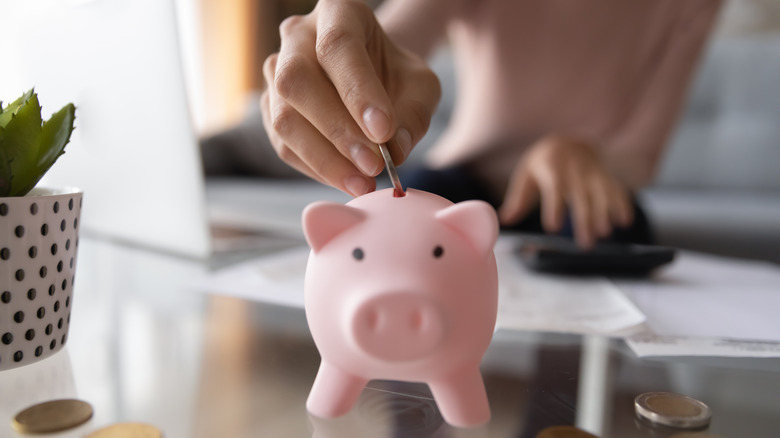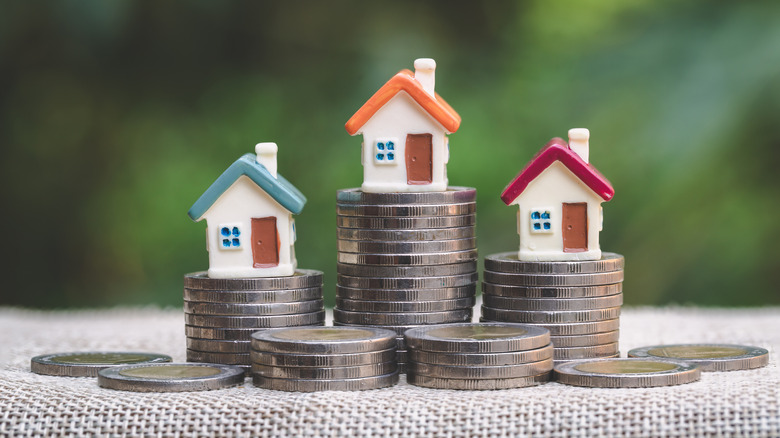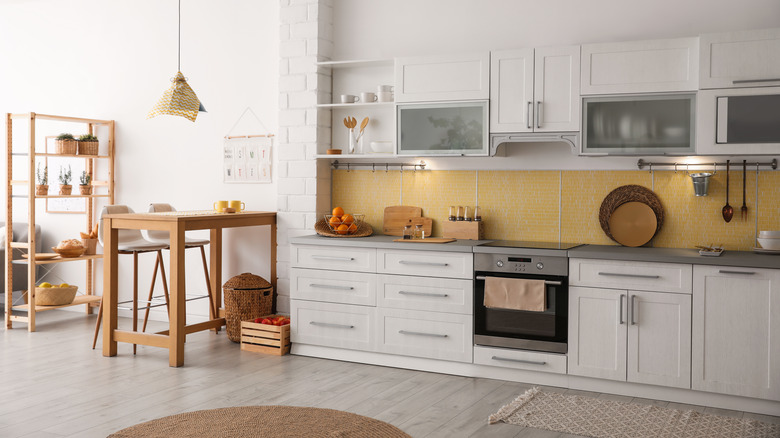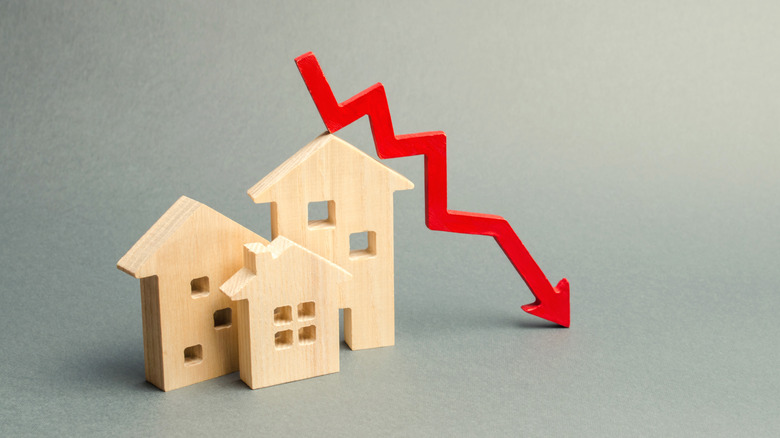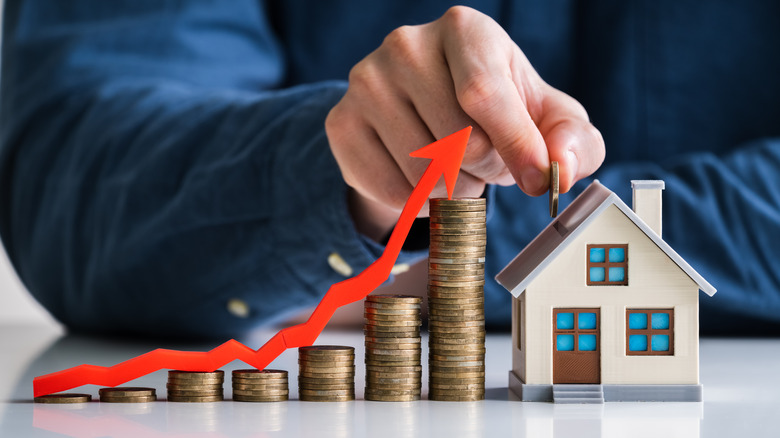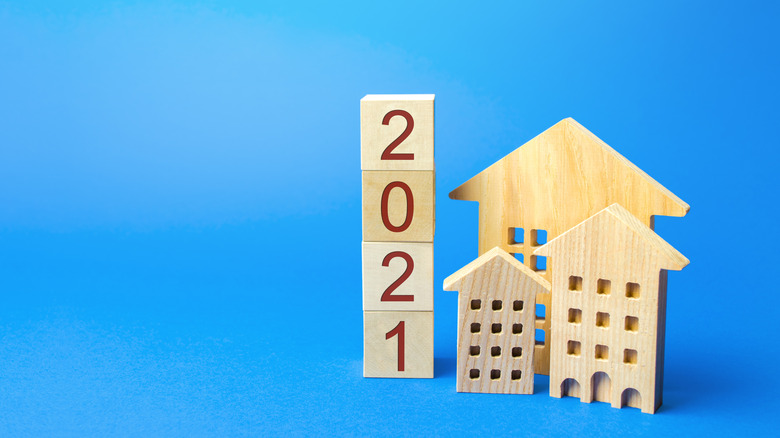Homebuying Mistakes That Could Cost You A Fortune
A home is a big purchase, and for many people, the costs can add up more than you plan them to. According to CBNC News, the sale price of the home itself is just scratching the surface. Between closing fees (which can amount to between 2-5% of your house price), moving costs (up to almost $5,000 for a cross-country move), and the all-important décor and upkeep for your new haven (potentially costing between $5,000-$10,000), things can get pricey fast. With most things related to real estate, no matter how much you think it'll cost, it'll probably cost more than that. So being prepared for unexpected sticker shock is crucial.
That's why any bumps in the road along the way can truly break your budget. Buying a house should be a joyous experience, but there are myriad mistakes you can make that might not only cause financial strain but could even stop you from getting the home of your dreams. We've rounded up some of the peskiest homebuying mistakes that could cost you a fortune, so you can make sure your buying process is as stress-free as can be.
Only getting one mortgage quote
When buying a home, it can be tempting to make your life as simple as possible, and just going for the first mortgage quote you get can be an attractive way to do so. But doing that can mean you're missing out on some premium deals, and you may end up paying a huge amount more in the long run.
According to Dana Bull, a realtor with Harborside Sotheby's International Realty in Marblehead, Massachusetts, this is a particularly common problem with first-time homebuyers. "There's a wide spectrum of service levels and programs available," she says in an interview with The Balance. "So many first-time buyers skip this step and miss out on an opportunity to secure the best service, program, and rate."
As a mortgage is a long-term commitment, not finding the best price you can may leave you seriously out of pocket, and there's no accounting for changes of circumstance or income in the future. So make sure you take the time to shop around, as it could be the best legwork you ever do.
Buying a little more house than you can afford
Look, we get it. No-one wants to settle for second-best. And when buying property, it's pretty easy to just nudge the price a little higher than you were comfortable with when budgeting, particularly if the house of your dreams comes along. What's vital to remember, though, is that your loan approval amount is not your budget, and not taking into account all of the other monthly outgoings you need to cover can leave you high and dry.
According to CNBC News, underestimating the true cost of buying and maintaining a home is the number one regret millennials have when buying a first-time home. Talking to House Beautiful, George Lawton, Realtor at RE/MAX Over the Mountain in Birmingham, Alabama, says that buying a house you can't afford can leave you "house poor, stressed, and unable to afford maintenance." As Lawton says, instead of that, "ask the lender to work backward to find what the budget can afford. This way, you can know the home fits in your budget, and you can find a home you can comfortably afford." Taking this small step can help you avoid huge issues further down the line.
Going with the first real estate agent you find
Your real estate agent is your closest ally when buying a home. From searching for the perfect house to closing the deal, you put a huge amount of responsibility for your future in their hands, which is why it's important to find one that you can trust with the task. Unfortunately, though, too many people go with the first realtor they find when embarking on a house search. And in their haste to simply get a realtor secured, many house-hunters can end up with someone less experienced and under-qualified than other competitors, and risk potentially being led into costly decisions by someone ill-equipped to handle your deal.
This is something that Daniel Bortz, a realtor operating in Virginia, warns against in his article for Realtor. As he recommends: "You want a professional who knows the ins and outs of the business, and that level of knowledge comes only with experience. Look for someone with at least a few years in the business." By shopping around and asking the right questions of your realtors, as Bortz suggests, you can make sure you're finding the best option out there, and saving your pennies.
Trying to go it alone, without a realtor
With the rise of online listings making it easier than ever before to find properties, it's easy to feel as though using a realtor is a lot of spend on agency charges for little gain. It's vital to remember, though, that realtors are paid for a reason: that they help you make the right choices and find a place that's worth paying for. And going into the home-buying process without a realtor can not only leave you with a huge headache but a much lighter purse.
As Tracie Rigione, Vice President of Sales at Al Filippone Associates/William Raveis Real Estate in Fairfield, Connecticut advises, a good realtor should guide you every step of the way. As she says to Real Simple, "Realtors educate people about the process, who they need to consult, if they need an attorney, when they'll have to have their down payment ready. And we can give valuable insights into the neighborhoods you're looking at." A good realtor is worth their weight in gold in the long term, so consider their payment an investment in a happier future.
Make sure you're not only working with the listing agent
There are more reasons why an agent working for your interests is pretty essential. Where the listing agent represents the seller of the property, the buyer's agent works on behalf of the buyer — you. And while the buyer's agent works with you to get you the best price possible, the listing agent is working to keep the price high for the seller, and, well... you can see how only working with the listing agent can drive the price you pay into the stratosphere. It's vital you make sure you get someone looking out for you during negotiations.
That's why Than Merrill, real estate investor and FortuneBuilders founder, strongly recommends working with a buyer's agent too. Writing on FortuneBuilders, he says: "For all intents and purposes, [listing agents] are trying to sell the home at the highest possible price; something first-time homebuyers are probably not all that fond of. Therefore, it is ill-advised for any first-time buyers to initiate any transactions through the listing agent." While this is particularly useful for first-time buyers, you could say the same for anyone buying a home. So, while a buyer's agent might cost extra, they may well save you money in the final deal.
Don't forget: location trumps all
We've all been in a position where we've been blown away by a breathtaking property that seems like an absolute steal. And sometimes you can forget that this property is inexplicably built in a location that's, shall we say, not ideal. And although the idea of a stand-out property in a run-of-the-mill location might have you feeling like the Joneses, don't forget that one day, you'll be selling up.
And that's where the trouble starts. Buying for the property itself and not thinking about location could leave you at a loss when you move on. It's something that Gerard Marino, a realtor based in southwest Florida, has seen before. As he said to Business Insider of people buying flashy properties in question-mark areas: "They forget that eventually they will need to sell [...] Most everything can be fixed but location, location, location can't be fixed. Buy location, NOT price." So, when you're searching for the new place to lay your head, make sure it's in a place that'll be attractive for future buyers too. Your future bank balance will thank you.
Don't blow all your savings on the down payment
With the median price of a new home in the US coming in at $349,400 for February 2021 (per the U.S. Census Bureau), chances are that even if your home costs less than that, your down payment will still be pretty high, all things considered. According to Credit.com, down payments can cost anywhere between 3.5% to 20% of your total house cost. While it feels logical to put everything you have into this significant payment so you can make a further dent in your monthly payments, if you go this route, you also risk being caught seriously short later on — and being in dire financial straits as a result.
Ed Conarchy, a mortgage planner and investment adviser at Cherry Creek Mortgage in Gurnee, Illinois, warns against this in an interview with Bank Rate: "Some people scrape all their money together to make the 20 percent down payment so they don't have to pay for mortgage insurance, but they are picking the wrong poison because they are left with no savings at all." Being left with no savings is scary at best, but when you have a mortgage to pay for and a new home to decorate? It's a fool's errand. Make sure you keep extra for everything after the house purchase.
Trying to make a smaller downpayment to save money
Although spending all your money on a down payment can spell financial ruin, trying to skimp on your down payment to save your cash can be equally problematic. Alan Hedrick of Compass, a real estate agency based in New York City, spoke of the pitfalls of paying less for your down payment, and in particular the impact it can have on your ongoing payments. Speaking to Business Insider, he says: "Putting a larger down payment could significantly reduce your monthly spending on your mortgage [...] It's okay to ask for outside help, like a gift for a down payment if it will help you obtain homeownership faster."
It's important to point out that asking for financial assistance from a close relation may not be an option for everybody, and for some, a smaller down payment may be the most viable option. If you can, however, more money on a down payment can have you saving big-time on monthly outgoings. Just make sure that your down payment isn't eating into any savings that you can't afford to spend. In short, like so many things, you have to find the right balance between too much and too little.
Buy with your head, as well as your heart
Most of us know the feeling of walking into a home and instantly falling in love with it. But if you're buying a property, bending over backward to secure the property of your dreams can be an error that may not only cause heartache if it doesn't work out, but financial stress if it does — particularly if you're compromising on budget to buy it.
As Tracie Rigione, Vice President of Sales at Al Filippone Associates/William Raveis Real Estate in Fairfield, Connecticut says, getting emotionally attached to homes can spell disaster for budgets. She recommends working with an impartial party, and told Real Simple, "If you love it so much that you feel like you'll do anything to get a property, you can end up overpaying [...] That can lead to buyer's remorse and feeling like you didn't get the best deal. The buying process is emotional enough, and that's why you want someone on your side that can keep your emotions in check through the close." Keep the process cool, for the sake of your wallet.
Don't put money down before you feel ready
There can often be the feeling that you have to move quickly when you find a house you want. But before you put down your cash, pause, and make sure it's a well-informed offer. If you act out of haste or fail to research the comparable sales of similar properties, you could end up paying way more than you bargained for, leaving you seriously out of pocket.
As Real Simple says, this is a common homebuying mistake, with Tracy Rigione, Vice President of Sales at Al Filippone Associates/William Raveis Real Estate in Fairfield, Connecticut, reminding that the negotiation part of the process is an area where a realtor shines. "Ultimately the price should reflect the market value of the home. The ideal negotiation is when the buyer and seller both feel like they've won," she explains. "The negotiations between your opening offer and your ideal number are where working with a real estate pro comes in handy." So, make sure you're in the know before signing that check.
Don't get distracted by décor details -- focus on the home's quality
A well-kept, well-decorated house can certainly raise its sale price, with simple changes increasing a home's value. Simply cleaning and decluttering a house, for example, can offer an astonishing 403% return on investment for a home sale, according to a 2012 survey undertaken and published by HomeGain. When you're the buyer, though, it's important to not get swept away by how nice a house looks and to scrutinize the build and quality of the home itself.
Not doing so can mean you're left with a house that's nice to look at, but hides structural issues that could cost you thousands to repair. Brian K. Lewis of Compass, a New York City-based real estate agency, explained this mistake to Business Insider, saying, "It's important not to be seduced by the icing on the cake [...] focus on the substance of a home — the quality of the construction and the level of finish." According to Lewis, "Many homes can be 'botoxed' to look pretty on the outside", but paying close attention to the bones of a home "will reveal the truth." Sounds like good advice to us!
Don't attempt to time mortgage rates
Trying to watch the mortgage market to see if you can 'time' it to get the best rate might have you feeling like you're in The Wolf of Wall Street, but it's not likely to help you save cash. It might even have you ending up spending more money, according to Viral Shah, the co-founder and head of financial products at mortgage lender Better.com, who spoke with The Balance. According to Shah, "The cost of waiting to see if rates go lower can backfire instantly, not making it worth the risk [...] The best rule of thumb is that if the numbers make sense, seize the opportunity."
The risk is that, if you wait too long to act, you may end up spending even more money than you would have if you acted when you were ready. What's more, by attempting to wait, you may also see house prices rise even as mortgage rates go down — and you may well lose that cute little property you've had your eye on for a while. Don't wait — when your wallet's right, it's time to act.
Not checking out property taxes for the area you're buying in
No-one likes to think about taxes, but when you're buying a home, it's essential. And property taxes are one of the biggest considerations when it comes to budget, particularly if you're moving farther away than just down the street. According to USA Today, property taxes can vary considerably from state to state — from an average of 0.3% of the home's value in Hawaii to approximately 2.21% of home value in New Jersey — and so moving between from one area to another can raise how much you pay.
So it's important to be rigorous with your property tax checks, as Marti Hampton, a realtor based in Raleigh, North Carolina, says. As she writes on her website Marti Hampton Real Estate, "go beyond looking at the tax amount stated on the listing sheet or the current tax bill. Call the county where the home is located and ask how often properties are reassessed and how much they go up on average. If it's been a while since the last reassessment, you could incur a large increase once you buy the home." A simple phone call could save thousands, so it pays to be prudent.
Going out and making large purchases just before closing on a home
Hey, big spender. We know how good it can feel to sign off on that house purchase. But try not to get carried away with the money you're spending in one go, particularly if you're thinking of making another sizeable purchase before you close on the deal, as it could cause some serious problems for your credit.
As Colin McDonald, licensed real estate agent with Berkshire Hathaway HomeServices Blake in Delmar, New York, this is something that happens a lot. As he says to House Beautiful: "A common mistake that I've noticed is that once a buyer is pre-qualified and has had an offer accepted by a seller, they will go out and purchase a car, apply for additional lines of credit, accrue more debt, miss payments, or pay late on current obligations". When this happens, McDonald explains that this "potentially could affect your credit score in a negative way, resulting in you not receiving final approval from your lender."
So, not only could it wreak havoc with your finances, but it could ruin your chances of getting the home you want. So wait on making those big purchases until after you've closed.

